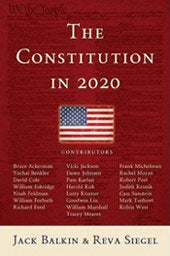The American Constitution Society of HLS sponsored “The Constitution in 2020,” a panel discussion in November featuring Harvard Law School Professors Yochai Benkler ’94, Frank Michelman’60, Mark Tushnet, and Noah Feldman, all contributors to a recently published book of the same title. The book’s goal is to contest the conservative idea that constitutional law should not be influenced by contemporary understandings of law and the political landscape.
Benkler focused on the interaction of information technologies and First Amendment rights, and suggested that freedom of speech is better protected when law-making bodies create rules and regulations that actively promote a diversity of viewpoints, rather than taking a “laissez-faire” approach to the marketplace for speech. He emphasized that copyright and patent laws, as well as laws regulating industries, will be just as important to the development of constitutional law in the future as civil rights laws.
“The critical point is, as you go forward, as you think about what goes into individual freedom and into a well-functioning democracy, you have to think about the basic technical and market infrastructure,” Benkler said. “What does that mean as a matter of what counts as constitutional law? It means that it’s not just constitutional law, it’s not just the First Amendment, it’s technical economic structures.”
Michelman provided an overview of the essay that he contributed to “The Constitution in 2020,” titled “Economic Power and the Constitution.” He argued that basic constitutional rights should encompass basic economic powers, including the ability to meet one’s own needs, including work, access to equal opportunities and political influence, safeguards for basic personal rights, an open and diverse media, and competitive markets. Michelman also emphasized that the best way to have these economic powers recognized as constitutional rights is by changing how people read the Constitution, rather than changing the text of the Constitution itself.
“How people read the Constitution depends on their background beliefs about what our laws actually would say about these matters if our laws were to conform to what the reader takes to be the country’s deepest political and social ideas,” he said. “So in other words, it depends on the background political culture, or constitutional culture. And as lawyers, our tools for working on that certainly don’t exclude the courtroom, but the courtroom isn’t going to be center stage.”
Tushnet analyzed the state action doctrine, which prevents the federal government from interfering with the actions of states and encourages judicial restraint in the application of federal laws. “For 30 years, conservatives have hijacked the Constitution, and we’re taking it back,” said Tushnet. He suggested that, by creating a space within which the public could participate more fully in governmental policymaking, the current, judicially-restrained reading of the Constitution could be expanded.
Tushnet emphasized that “what we need to do is participate in the creation of a constitutional culture in which participation by the public in the shaping of public policy is understood as a constitutional activity. Not merely that you are engaging in something constitutionally permissible when you’re engaging in policies, but the policies that you are promoting are themselves… oriented to the Constitution.”
Concluding the presentation, Feldman noted: “All of us have spoken about a vision of the Constitution in which the Constitution is not a piece of paper, it’s not even the body of constitutional law, i.e. binding court decisions, that interpret that piece of paper. The Constitution is something completely different. The Constitution is a collection of customs, practices, beliefs, laws, and values, which includes market structures and other institutional structures, which together shape and legitimate the exercise of not just public power, but all power in our society. And it is a progressive… vision to see the Constitution that way.”
He went on to describe the process of constitutional politics, and how views about the meaning and scope of the Constitution are changed through political conversation and action.
“It’s about viewing constitutional politics in real world terms, where you identify constituencies, interest groups, values and desires that actually motivate people, and address them, and deal with them directly,” he said. “I think that’s a part of the process of constitutional politics, and it’s desirable, and it’s a progressive way of thinking to acknowledge that it’s a justifiable and legitimate part of how constitutional law and constitutional studies, more broadly, and constitutional politics in the deepest sense ought to operate.”
In addition to the contributions of the panelists, the book “The Constitution in 2020” includes 23 essays, including one from HLS Professor Cass Sunstein.
A companion website, www.Constitution2020.org, includes ten sample chapters from the book, essays about the future of the U.S. Constitution, discussions of current constitutional issues, a bibliography and resources for further study.
In early October, the Yale Law chapter of the American Constitution Society hosted The Constitution in 2020 Conference, bringing top legal scholars, practitioners, and activists from around the country to Yale Law School for in-depth discussions about the future of American constitutional law.
